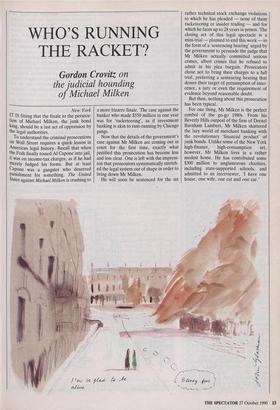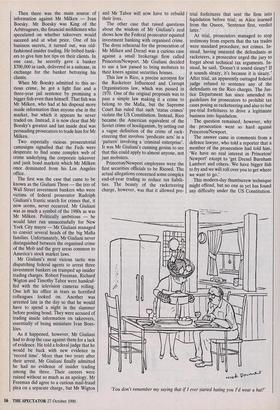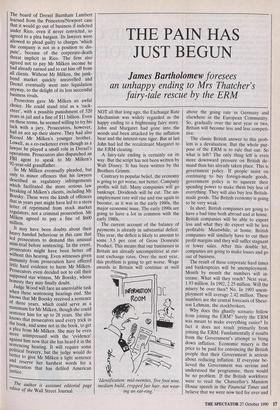WHO'S RUNNING THE RACKET?
Gordon Crovitz on
the judicial hounding of Michael Milken
New York IT IS fitting that the finale to the persecu- tion of Michael Milken, the junk bond king, should be a last act of oppression by the legal authorities.
To understand the criminal prosecutions On Wall Street requires a quick lesson in American legal history. Recall that when the Feds finally tossed Al Capone into jail, it was on income-tax charges, as if he had merely fudged his forms. But at least Capone was a gangster who deserved Punishment for something. The United States against Michael Milken is crashing to a more bizarre finale. The case against the banker who made $550 million in one year was for 'racketeering', as if investment banking is akin to rum-running by Chicago gangs.
Now that the details of the government's case against Mr Milken are coming out in court for the first time, exactly what justified this prosecution has become less and less clear. One is left with the impress- ion that prosecutors systematically stretch- ed the legal system out of shape in order to bring down Mr Milken.
He will soon be sentenced for the six rather technical stock exchange violations to which he has pleaded — none of them racketeering or insider trading — and for which he faces up to 28 years in prison. The closing act of this legal spectacle is a mini-trial — planned to end this week — in the form of a 'sentencing hearing' urged by the government to persuade the judge that Mr Milken actually committed serious crimes, albeit crimes that he refused to admit in his plea bargain. Prosecutors chose not to bring their charges to a full trial, preferring a sentencing hearing that denies their target of presumption of inno- cence, a jury or even the requirement of evidence beyond reasonable doubt.
But then, nothing about this prosecution has been typical.
For one thing, Mr Milken is the perfect symbol of the go-go 1980s. From his Beverly Hills outpost of the firm of Drexel Burnham Lambert, Mr Milken shattered the lazy world of merchant banking with the revolutionary 'financial product' of junk bonds. Unlike some of the New York high-finance, high-consumption set, however, Mr Milken lives in a rather modest home. He has contributed some $300 million to unglamorous charities, including state-supported schools, and admitted to an interviewer, 'I have one house, one wife, one cat and one car.' Then there was the main source of information against Mr Milken — Ivan Boesky. Mr Boesky was King of the Arbitrageurs, the financial middlemen who speculated on whether takeovers would succeed and at what price. One of his business secrets, it turned out, was old- fashioned insider trading. He bribed bank- ers to give him hot tips on their clients. In one case, he secretly gave a banker $700,000 in cash, delivered in a suitcase, in exchange for the banker betraying his clients.
When Mr Boesky admitted to this se- rious crime, he got a light fine and a three-year jail sentence by promising a bigger fish even than himself. That fish was Mr Milken, who had at his disposal more inside information than anyone else in the market, but which it appears he never traded on. Instead, it is now clear that Mr Boesky's greatest and last inside deal was persuading prosecutors to trade him for Mr Milken.
Two especially vicious prosecutorial campaigns signalled that the Feds were desperate to find some complex web of crime underlying the corporate takeover and junk bond markets which Mr Milken once dominated from his Los Angeles office.
The first was the case that came to be known as the Giuliani Three — the trio of Wall Street investment bankers who were victims of federal prosecutor Rudolph Giuliani's frantic search for crimes that, it now seems, never occurred. Mr Giuliani was as much a symbol of the 1980s as was Mr Milken. Politically ambitious — he would later run unsuccessfully for New York City mayor — Mr Giuliani managed to convict several heads of the big Mafia families. Unfortunately, Mr Giuliani never distinguished between the organised crime of the Mob and the grey areas common to America's stock market laws.
Mr Giuliani's most vicious tactic was dispatching federal agents to arrest three investment bankers on trumped up insider trading charges. Robert Freeman, Richard Wigton and Timothy Tabor were handcuf- fed with the television cameras rolling. One left his office in tears as horrified colleagues looked on. Another was arrested late in the day so that he would have to spend a night in the slammer before posting bond. They were accused of trading inside information on takeovers, essentially of being miniature Ivan Boes- kies.
As it happened, however, Mr Giuliani had to drop the case against them for a lack of evidence. He told a federal judge that he would be back with new evidence in `record time'. More than two years after their arrest, Mr Giuliani finally admitted he had no evidence of insider trading among the three. Their careers were ruined without so much as an apology. Mr Freeman did agree to a curious mail-fraud plea on a separate charge, but Mr Wigton and Mr Tabor will now have to rebuild their lives.
The other case that raised questions about the wisdom of Mr Giuliani's zeal shows how the Federal prosecutor equated investment banking with organised crime. The dress rehearsal for the prosecution of Mr Milken and Drexel was a curious case against a small brokerage firm called Princeton/Newport. Mr Giuliani decided to use a law passed to bring mobsters to their knees against securities houses.
This law is Rico, a precise acronym for the Racketeer Influenced and Corrupt Organisations law, which was passed in 1970. One of the original proposals was to pass a simple law making it a crime to belong to the Mafia, but the Supreme Court has ruled that such 'status crimes' violate the US Constitution. Instead, Rico became the American equivalent of the Soviet crime of hooliganism, by setting out a vague definition of the crime of rack- eteering that involves 'predicate acts' in a `pattern' involving a 'criminal enterprise'. It was Mr Giuliani's cunning genius to see that this could apply to almost anyone, not just mobsters.
Princeton/Newport employees were the first securities officials to be Ricoed. The actual allegations concerned some complex end-of-year trading to reduce tax liabili- ties. The beauty of the racketeering charge, however, was that it allowed pre- trial forfeitures that sent the firm into liquidation before trial; as Alice learned from the Queen, 'Sentence first, verdict later.'
At trial, prosecutors managed to stop testimony from experts that the tax trades were standard procedure, not crimes. In- stead, having smeared the defendants as racketeers, a prosecutor urged the jury to forget about technical tax arguments. In- stead, he said, 'Doesn't it sound sleazy? If it sounds sleazy, it's because it is sleazy.' After trial, an apparently outraged federal judge refused to sentence any of the defendants on the Rico charges. The Jus- tice Department has since amended its guidelines for prosecutors to prohibit tax cases posing as racketeering and also to bar pre-trial forfeitures to drive a legitimate business into liquidation, The question remained, however, why the prosecution went so hard against Princeton/Newport, The answer came in comments from a defence lawyer, who told a reporter that a member of the prosecution had told him, `We have no real interest in Princeton/ Newport' except to 'get Drexel Burnham Lambert and others. We have bigger fish to fry and we will roll over you to get where we want to go.'
This modern-day thumbscrew technique might offend, but no one as yet has found any difficulty under the US Constitution.
You don't remember my saying that if I ever started hating you I'd wear a hat?'
The board of Drexel Burnham Lambert learned from the Princeton/Newport case that it would go out of business if indicted under Rico, even if never convicted, so agreed to a plea bargain. Its lawyers were allowed to plead guilty to charges 'which the company is not in a position to dis- pute', because of the corporate-death threat implicit in Rico. The firm also agreed not to pay Mr Milken income he had already earned and to cut him off from all clients. Without Mr Milken, the junk- bond market quickly unravelled and Drexel eventually went into liquidation anyway, to the delight of its less successful business rivals.
Prosectors gave Mr Milken an awful choice. He could stand trial as a 'rack- eteer', with a possible punishment of 520 years in jail and a fine of $11 billion. Even on these terms, he seemed willing to try his luck with a jury. Prosecutors, however, had an ace up their sleeve. They had also Ricoed Mr Milken's younger brother, Lowell, as a co-racketeer even though as a lawyer he played a small role in Drexel's operations. Prosecutors also dispatched an FBI agent to speak to Mr Milken's 92-year-old grandfather.
So Mr Milken eventually pleaded, but only to minor offences that his lawyers described as regulatory infringements which facilitated the more serious law breaking of Milken's clients, including Mr Boesky. These were the kinds of offences that in years past might have led to a stern letter of reprimand from stock market regulators, not a criminal prosecution. Mr Milken agreed to pay a fine of $600 million.
It may have been doubts about their heavy handed behaviour in this case that led prosecutors to demand this unusual mini-trial before sentencing. In the event, prosecutors might have been better off without this hearing. Even witnesses given immunity from prosecution have offered little hard evidence to harm Mr Milken. Prosecutors even decided not to call their supposed star witness, Mr Boesky, whose honesty they may finally doubt.
Judge Wood will face an unenviable task when these sentencing hearings end. She knows that Mr Boesky received a sentence of three years, which could serve as a maximum for Mr Milken, though she could sentence him for up to 28 years. She also knows that prosecutors used every trick in the book, and some not in the book, to get a plea from Mr Milken. She may be even more unimpressed with the 'evidence' against him now that she has heard it in the sentencing hearing. It will require some Political bravery, but the judge would do better to give Mr Milken a light sentence and reserve her harshest words for a prosecution that has defiled American
justice.
The author is assistant editorial page editor of the Wall Street Journal.




































































 Previous page
Previous page